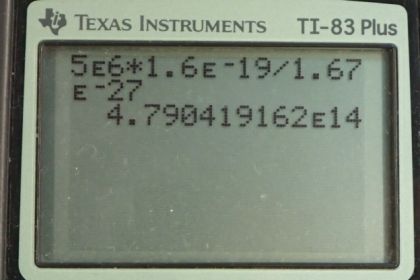Question
Calculate the initial (from rest) acceleration of a proton in a electric field (such as created by a research Van de Graaff). Explicitly show how you follow the steps in the Problem-Solving Strategy for electrostatics.
Final Answer
Solution video
OpenStax College Physics, Chapter 18, Problem 31 (Problems & Exercises)

vote with a rating of
votes with an average rating of
.
Calculator Screenshots
Video Transcript
This is College Physics Answers with Shaun Dychko. We're going to calculate the acceleration of a proton in the presence of an electric field of five times ten to the six newtons per Coulomb. So because it's a proton, we know its charge is the elementary charge of 1.6 times ten to the minus 19 Coulombs. And we also know its mass of 1.67 times ten to the minus 27 kilograms. Now the net force on the proton is mass times its acceleration and we can divide both sides by m to solve for a. So it's the force divided by m. And the force in this case is the electric field multiplied by the charge. And so we have Eq substituted for F. And so we have five times ten to the six newtons per Coulomb times the charge divided by the mass giving an acceleration of 4.79 times ten to the 14 meters per second squared.


